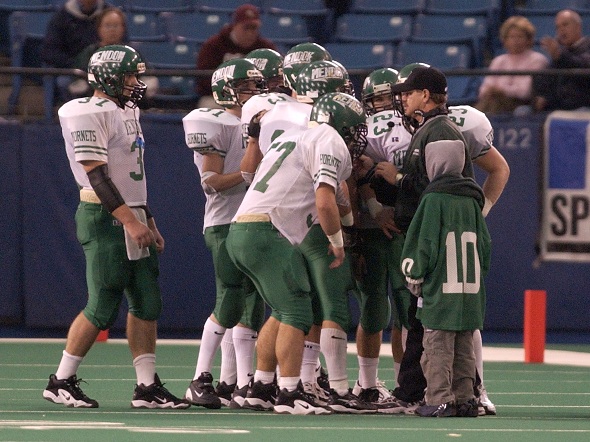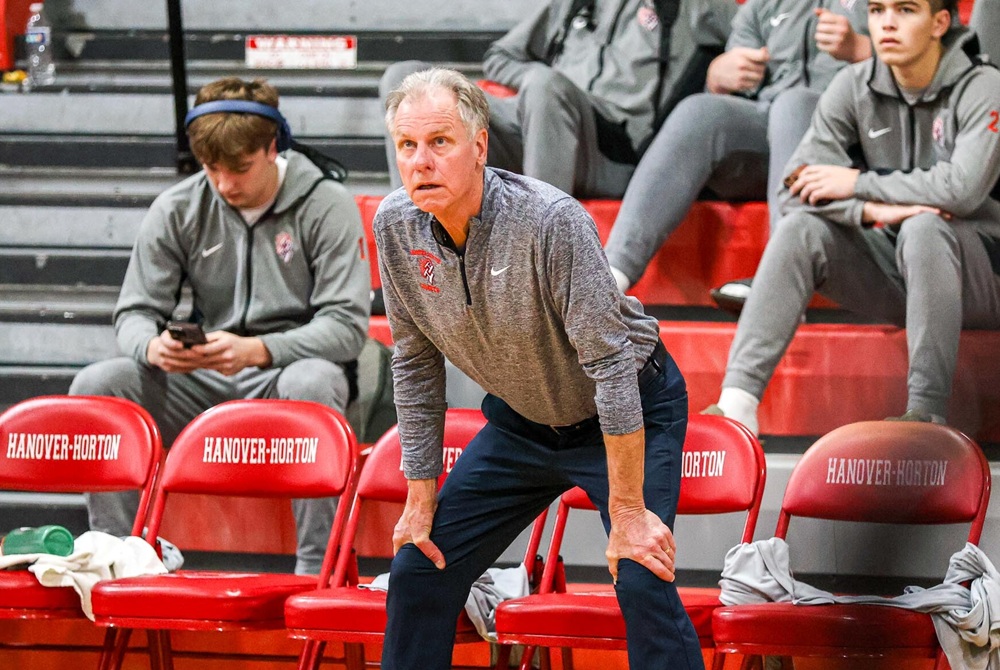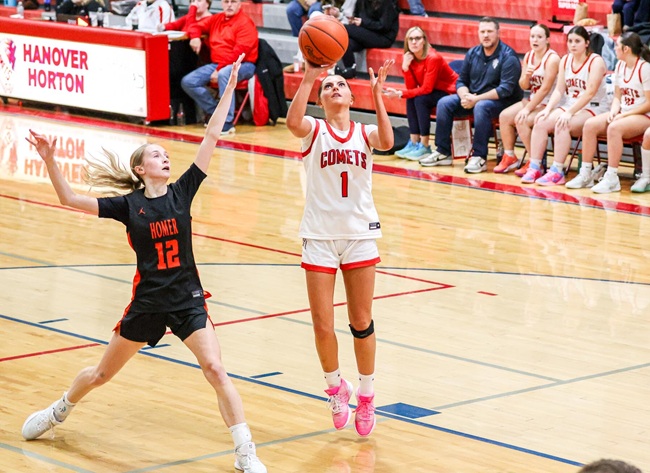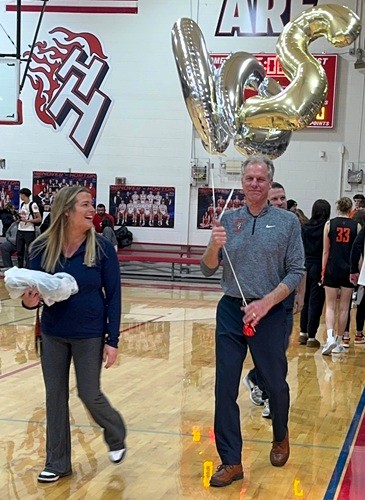
MHSA(Q&)A: Mendon football coach John Schwartz
February 2, 2012
 John Schwartz didn’t really want the Mendon football head coaching job when a group of players convinced him to take it before the 1989 season. And his first contract started out on a napkin. The rest is history.
John Schwartz didn’t really want the Mendon football head coaching job when a group of players convinced him to take it before the 1989 season. And his first contract started out on a napkin. The rest is history.
Mendon won its 11th MHSAA football championship this fall, downing Fowler 33-0 in the Division 8 Final, to tie for third-most football titles won by one program. Schwartz has coached in the program for all 11, including 10 as head coach, and his record of 236-39 gives him a winning percentage of .858, tops in the MHSAA record book. He recently was selected as this year’s recipient of the high school Duffy Daugherty Award, annually given for career contributions to the game. He follows recent winners Ralph Munger of Rockford and Herb Brogan of Jackson Lumen Christi.
His Mendon teams have had just one losing season. And although he retired a year ago after 36 teaching middle school science, and then fought off cancer over the summer, he has no plans to leave his post on the Hornets’ sideline.
How would you characterize your program?
I think we have very good coaches and I think the kids respect the coaches, and they know the coaches think more of them than just being football players. They care about them. We have their attention, and what we really try to do is form a team concept as soon as we can. We try to stay away from giving any one person too much recognition. We don't give out MVP awards at the end of the year. It's a program where we're all in it together: coaches, kids and community. We try to get the best out of the kids, give the kids the best shot we have at being the best we can be.
How does a small school continue to reload every season?
My first year there, the first thing I did as a head coach was I started the junior high program. I think that's where everything starts. We even have the younger kids called the rocket kids, and those coaches come in and talk about (football) terms so when kids move from one level to another there's no re-teaching. Everyone has an ego, coaches have egos, and they like to do some things differently. But we don't have that. They do what we do. We give them a lot of flexibility, but we have certain drills we want to run. By the time we get them, these kids are in tune with what we are doing. The summer program also is something I started my first year as head coach too. ... It means that during the season we can concentrate more on teaching than conditioning.
You went from 3-6 in 2006 to 12-0 in 2007. Explain how you bounced back.
The losing season we had, we didn't have a lot of kids, and our two best kids were hurt early in the season and couldn't play. We never did bounce back. Even in that season, we were ahead at halftime in all but one game. We just didn't have enough to come back and pull the game out, and we had some very tough games. It wasn't a good season, but I thought those kids played awfully hard for what we had. We got a lot of experience, and it paid off the following year.
Our JVs practice with the varsity. When I work with inside linebackers, I work with (grades) 9-12. Kids learn quicker from kids than from coaches, as far as I'm concerned. ... Football's really changed. It's become a lot more complex. I think we have to delegate more and more every year so we can stay with the changes. It's too much for one person. I remember my first three, four or five years it was just three of us at the varsity level. The other two, neither one taught at the school. We were pretty successful right off the bat, and we started getting more and more interest from people. Now 9-12 we have seven coaches, and we have three at the junior high, and all the coaches but two have played for me. They know what I expect, what I'm looking for, what I want. ... And they want to win. I'd be lost without those guys.
Are there certain seasons that have meant more than others?
The first year I took the job, in 1989, we went undefeated and won a state title. A lot of those kids are very good friends of mine yet, and they're pretty special to me. They were a big boost to my program. In the '95 year, my son was a sophomore on that state title team. I remember a lot about that team.
They all have something they did very well. They either threw the ball well or played great defense or had a big line. When I hear a year now, I think about those teams.
You grew up in a small town (Colon) and have taught and coached in a small town. Was that important for you to do?
I've never taught anywhere else. I never felt I really had a reason to leave. I've gone through at least six superintendents since I've been there. The fourth or fifth said to me, "The only thing that bothers me about Mendon is these people think an awful lot of winning. There are other things." He asked me, "How do you feel about it?" I said, if they didn't feel that way, I wouldn't be here.
Who was your biggest coaching influence?
I would say Morley (Fraser, Jr., under whom Schwartz was an assistant for three seasons). Years before I got there, Mendon was pretty good in the early 70s, and then in the mid 70s football wasn't very good. I was the JV coach the first year, and the second year after two games they brought me up to varsity. The best thing I did was I told them I would not take the head job, but I'll assist. I knew (Fraser) was the kind of person and personality we needed there. It wasn't necessarily all of his football knowledge, but his energy and excitement that he brought to the game.
You said during the Finals postgame press conference that you'd battled cancer during the summer. How did you come back, and did you ever think that might be time to step down?
Everything's fine. I had coaches that took over. At the same time that that happened, I was retiring. If you retire in Michigan, you can't be at the school for one month. So I couldn't be at summer weights all the way through June. So my coaches did all the summer weights. But I had no intention of stepping down. If something (bad) came down ... but once they said they got it, everything went as normal.
After a championship season, how do you ramp things back up for the next fall and a new group of players?
When we go to the playoffs, we take all the JVs unless there are couple who don't want to go. They experience that and get an extra five weeks of practice if we win a state title. And they're excited about it. They want to do that. They’ve' tasted it, and they want a part of that the next year. We remind them it's not what you did, it's what can you do for me now. ... This is your year.
We talk about winning state championships from day one. A lot of people say we shouldn't do that, but why not? Isn't that the ultimate goal? I can't imagine telling a team we think we could be 7-2 this year. We expect to be 9-0 every year. Of course, that's not going to happen. But at same time, I think the losses make you better the following week. We've won state titles where we haven't won the league title. ... You get better.
PHOTO: Mendon coach John Schwartz talks things over with his players during the Hornets' 21-14 win over Decatur in the 2002 Division 7 Final at the Pontiac Silverdome.


200 Wins Later, Lusk's 'Yes' Still Paying Off as Hanover-Horton Surges
By
Doug Donnelly
Special for MHSAA.com
February 3, 2026
Joe Lusk has had to be talked into coaching a couple of times.
But that hasn’t stopped him from being a winner.
 The Hanover-Horton girls basketball coach picked up career victory No. 200 last week when the Comets improved to 12-1 with a victory over Homer. It’s the best start to the season for Hanover-Horton since girls basketball transitioned from a fall sport to winter two decades ago.
The Hanover-Horton girls basketball coach picked up career victory No. 200 last week when the Comets improved to 12-1 with a victory over Homer. It’s the best start to the season for Hanover-Horton since girls basketball transitioned from a fall sport to winter two decades ago.
“He holds his girls accountable and wants to get the best out of each and every one of them,” said Comets athletic director Chris VanEpps. “We are very lucky to have him here at Hanover-Horton.”
Lusk’s career spans two Cascades Conference schools – his alma mater Michigan Center, and Hanover-Horton for the past five seasons. He was also on the bench at Michigan Center when the Cardinals enjoyed incredible success under coach Scott Furman.
Lusk’s story isn’t the typical one about a high school athlete growing up wanting to be a coach. The Consumers Energy retiree, in fact, never considered coaching basketball until his daughter Courtney came home one day and told him he was coaching her team.
“She was in the fifth grade,” Joe Lusk said. “She told me there was a tournament at Vandercook Lake, she was playing and I was going to coach. I told her no way.”
That no slowly turned into a yes.
 After coaching the youth basketball team for several years, Lusk was asked by Furman to join his varsity staff.
After coaching the youth basketball team for several years, Lusk was asked by Furman to join his varsity staff.
“He probably asked me 20 times,” Lusk said. “I kept telling him no. Ten years later, I was still coaching.”
Courtney grew into a varsity player and Lusk became an assistant coach.
“The joke at our house was she was either going to be a good basketball player or she was going to be in therapy,” Lusk said. “She would come home after a tough game and say, ‘Is tonight a therapy night?’”
Not much therapy was needed. The Cardinals went through a remarkable run during which they reached the MHSAA Finals twice and Semifinals another season before Courtney graduated in 2006.
Joe Lusk remained an assistant but, in 2012, Furman died, shocking the Michigan Center community. The ultra-successful coach had won more than 350 games during his career. Lusk took over the job, although he had reservations about becoming head coach.
Over the next nine seasons those reservations were put to rest as the Cardinals won 149 games. In 2018, they went 23-3 and made a run to the Division 3 Semifinals.
Lusk’s last season at Michigan Center was 2020-21. In June 2021, he was hired at Hanover-Horton.
“They found out there was an opening at Hanover and my wife (Cindy) and Courtney put together my resume and sent it in,” Lusk said. “They told me they were doing it. They wouldn’t let me quit (coaching).”
He was hired.
 “Having an experienced coach like Coach Lusk is very important for our program,” VanEpps said. “His consistency and effort to make things better, not just for his teams, but for Hanover-Horton in general, give our younger staff someone to model themselves after. As for the girls on his team, he is stern but fair, which is something that can be lost on our younger generations.”
“Having an experienced coach like Coach Lusk is very important for our program,” VanEpps said. “His consistency and effort to make things better, not just for his teams, but for Hanover-Horton in general, give our younger staff someone to model themselves after. As for the girls on his team, he is stern but fair, which is something that can be lost on our younger generations.”
As for his current team being 12-1, Lusk knows the Comets have difficult games coming up. The Comets face Michigan Center (12-2) on Wednesday, Brooklyn Columbia Central (9-2) in a Cascades Conference West game in two weeks and state-ranked Concord in a nonconference matchup. Hanover-Horton also is in a District with powerhouses like Jackson Lumen Christi and Grass Lake. If the Comets win the Cascades West, they will likely face Grass Lake in the conference title game.
“We know the second half of our schedule is loaded,” he said.
Through it all, basketball remains a family sport. Courtney is the Comets’ junior varsity coach. Cindy keeps the scorebook for every game, something she has done for years.
“We are a basketball family,” Lusk said. “If Cindy didn’t do what she does, I wouldn’t be here today. She does a lot of work. For our juniors program, she keeps track of everything, all of the kids, what their shirt sizes are. If I had to do all of that, I wouldn’t be doing it. She loves basketball.”
 Doug Donnelly has served as a news and sports reporter at the Adrian Daily Telegram and the Monroe News for 30 years, including 10 years as city editor in Monroe. He's written a book on high school basketball in Monroe County and compiles record books for various schools in southeast Michigan. He is now publisher and editor of The Blissfield Advance, a weekly newspaper. E-mail him at [email protected] with story ideas for Jackson, Washtenaw, Hillsdale, Lenawee and Monroe counties.
Doug Donnelly has served as a news and sports reporter at the Adrian Daily Telegram and the Monroe News for 30 years, including 10 years as city editor in Monroe. He's written a book on high school basketball in Monroe County and compiles record books for various schools in southeast Michigan. He is now publisher and editor of The Blissfield Advance, a weekly newspaper. E-mail him at [email protected] with story ideas for Jackson, Washtenaw, Hillsdale, Lenawee and Monroe counties.
PHOTOS (Top) Hanover-Horton girls basketball coach Joe Lusk monitors the action during a game this season. (Middle) Lila Hamisfar (1) puts up a shot against Homer. (Below) Lusk carries balloons celebrating his 200th win alongside Hanover-Horton teacher and basketball parent Courtney Toteff. (Top and middle photos by Hannah Tacy/JTV. Below photo courtesy of Cindy Lusk.)

